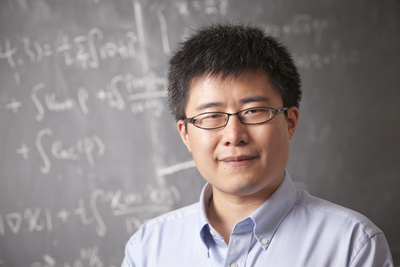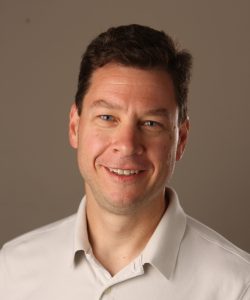Faculty and Staff

Lingchong You
Director of Duke Center for Quantitative Biodesign & James L. Meriam Distinguished Professor of Biomedical Engineering
The You lab (youlab.bio) uses a combination of mathematical modeling, machine learning, and quantitative experiments to elucidate principles underlying the dynamics of microbial communities for applications in computation, engineering, and medicine. Dr. You pioneered the programming of collective behaviors of microbial communities in time and space using chemical and genetic communication. Dr. You is a David and Lucile Packard Fellow (2006), a Dupont Young Professor(2008), an NSF Career Awardee (2010), and a fellow of the American Institute for Medical and Biomedical Engineering (2019). He currently serves on the editorial boards of several journals, including Molecular Systems Biology, PLoS Computational Biology, Quantitative Biology, and ACS Synthetic Biology.

Xavier Larkin
Program Coordinator, Duke Center for Quantitative Biodesign
Xavier Larkin received a B.A. from Morehouse College and earned an M.A. degree from Texas State University. Xavier serves as the Program Coordinator where he aids in operational and programmatic decision- making that has a significant impact on the achievement of the Duke Center for Quantitative Biodesign. Xavier develops and implements procedures, processes, services, and systems within the Center.

David Carlson
Assistant Professor, Civil and Environmental Engineering, Biostatistics and Bioinformatics
His research is focused on developing machine learning methods to facilitate data-driven science, primarily using probabilistic and deep learning approaches. He has previously published on a wide range of algorithmic problems, including efficient inference, stochastic optimization, and interpretable models. He is particularly interested in applying these techniques to develop testable hypotheses and design confirmatory experiments, which have resulted in applications in several areas across engineering and health. A major current focus is on developing explainable artificial intelligence (XAI) approaches so that the XAI becomes a collaborator with scientists in future experimental design.

Pranam Chatterjee
Assistant Professor, Biomedical Engineering
Research in Dr. Chatterjee’s Programmable Biology Group exists at the interface of computational design and experimental engineering, specifically employing state-of-the-art machine learning methods to engineer programmable proteins for applications in genome, proteome, and cell engineering. A PhD graduate of the MIT Media Lab, he developed robust genome editing technologies that represent some of the broadest, safest, and most effective CRISPR enzymes to date. More recently, Dr. Chatterjee’s research has extended to the emergent field of “proteome” editing, where his team leverages structure and sequence-based design to engineer potent peptide fusions that target and degrade pathogenic proteins, including those implicated in viral diseases and cancer. His team’s established expertise in machine learning are further being applied to develop transcription factor-based stem cell differentiation protocols for ovarian cell types, including primordial germ cells and oocytes. Overall, his team’s long-term goals are three-fold: (1) Enable the de novo design of protein-based therapeutics; (2) Leverage these platform technologies to prolong and promote reproductive health-spans; (3) Extend protein design toolkits to global problems beyond biomedicine.

Ashutosh Chilkoti
Alan L. Kaganov Distinguished Professor, Biomedical Engineering
The Chilkoti lab’s areas of research include genetically encoded materials and the development of synthetic biomolecular condensates for synthetic biology. He has published ~330 papers, has been cited ~42,000 times, has a Google Scholar H-index of 107, and has 40 patents and 60 patent applications in process. Prof. Chilkoti was awarded the Clemson Award for Contributions to the Literature by the Society for Biomaterials in 2011, the Robert A. Pritzker Distinguished Lecture award by the Biomedical Engineering Society in 2013, was elected to the National Academy of Inventors in 2014, received the Distinguished Alumni award from the Indian Institute of Technology, Delhi in 2015, and the Diamond award from the College of Engineering at the University of Washington in 2017. He is a fellow of the American Association for the Advancement of Science. He is the founder of six start-up companies: (1) PhaseBio Pharmaceuticals, a publicly traded company on NASDAQ (sticker: PHAS) that is taking drug delivery technology that he developed into clinical trials; (2) Sentilus, a clinical diagnostics company that was acquired by Immucor in 2014; (3) BioStealth, a spinoff of Sentilus; (4) GatewayBio, that is commercializing a next-generation PEGylation technology for biologics; (5) Isolere Bio that is developing a non-chromatographic technology for purification of biologics; and (6) inSoma Bio that is developing a recombinant protein matrix for tissue reconstruction.

Emma Chory
Assistant Professor of Biomedical Engineering
Emma Chory received her Ph.D. in Chemical Engineering from Stanford University in the lab of Gerald Crabtree, where she worked on chromatin remodeling complexes in cancer. As postdoctoral fellow with Kevin Esvelt and Jim Collins at MIT, she developed novel systems to enable the high-throughput, systematic, and quantitative evolution of therapeutic proteins using automation and directed evolution. Her lab opened at Duke during the Summer of 2023 in the Center for Advanced Genomic Technologies.
The Ciocanel group uses dynamical systems and stochastic process modeling, simulation, and data analysis to give insights into mechanisms regulating intracellular transport and filament organization. Dr. Ciocanel collaborates with experimental researchers on problems related to messenger RNA localization in developing oocytes, neurofilament transport in axons, actin-myosin protein interactions, and organization of filaments in neuronal dendrites. Dr. Ciocanel serves as the Chair of the Cell and Developmental Biology subgroup of the Society of Mathematical Biology.

Lawrence David
Associate Professor, Molecular Genetics and Microbiology and Interim Director of the Duke Microbiome Center.
The David Lab studies relationships between diet, the gut microbiome and human health. The lab is also interested in engineering new tools at the interface of nutrition and microbiology, including building genomic approaches for tracking food intake and microfluidic techniques for high-throughput assay of microbial metabolism. Lawrence was a Junior Fellow at the Harvard Society of Fellows, and he received a Ph.D. in Computational & Systems Biology from the Massachusetts Institute of Technology and a B.S. in Biomedical Engineering from Columbia University. Lawrence has been named one of the 10 Scientists under 40 years old to watch by ScienceNews and his work has been recognized with innovator and investigator awards from the Burroughs Wellcome Fund, the Searle Scholars Program, and the Arnold & Mabel Beckman, Hartwell, Alfred P. Sloan, and Damon Runyon Foundations.

Stefano Di Talia
Associate Professor, Cell Biology
The Di Talia lab is interested in the physical principles of organization of multicellular systems. Using live imaging, computational analyses and mathematical model, the lab is dissecting how the cell cycle is organized in early fly embryo and how tissue size is controlled during zebrafish regeneration. Recently, we have discovered the role of signaling waves, cytoplasmic and cellular flows in the control of embryonic mitosis and bone regeneration.

Bruce Donald
James B. Duke Distinguished Professor, Computer Science, Mathematics, and Chemistry and Professor of Biochemistry.
Bruce Donald received a B.A. from Yale University, and a Ph.D. from MIT. He was a professor in the Computer Science Department at Cornell University from 1987-1998. In the 1990’s, he worked at Paul Allen’s tech company, Interval Research. More recently, Donald founded Ten63 Therapeutics. Donald received a National Science Foundation Presidential Young Investigator Award, and was named a Guggenheim Fellow for his work on algorithms for structural proteomics. He is a Fellow of the ACM, Fellow of the AAAS, and Fellow of the IEEE. Bruce Donald’s research focuses on computationsl and experimental studies of protein structure & design, with an Emphasis on AI-based techniques for predicting & overcoming resistance, and designing therapeutics to thwart and overcome resistance.

Amy Gladfelter
Professor, Department of Cell Biology
Amy Gladfelter, PhD is a quantitative cell biologist and a Professor of Cell Biology at Duke University. She applies a variety of microscopy and biophysical approaches to study fungal cell biology in diverse model fungal systems and is working to establish new marine fungal systems. She has been honored with the 2014 Graduate Mentoring Award from Dartmouth, the 2015 Mid-Career Award for Excellence in Research from the American Society of Cell Biology and is a Howard Hughes Medical Institute Faculty Scholar.
The Gladfelter Lab is fascinated by how life is encoded in molecules but functions at many different lengths scales, well beyond the nanoscale. We study how the physical properties of molecules lead to emergent organization at the mesoscale. In one area of work, we examine how RNA sequence encodes structures to promote phase separation and the formation of biomolecular condensates that pattern the cytosol. In a second area of work, we study how cytoskeletal polymers enable cells to sense their shape. We combine bottom-up reconstitution, biophysical approaches and computational modeling with live cell imaging and genomics to pursue these studies in a highly interdisciplinary team.

Raluca Gordan
Associate Professor of Biostatistics and Bioinformatics, Computer Science, and Molecular Genetics and Microbiology
The Gordan lab is investigating molecular mechanisms that drive gene regulation in eukaryotic cells, as well as the interplay between transcriptional regulation and DNA damage, repair, and replication, with a strong focus on understanding mutagenesis in regulatory DNA. The Gordan lab develops and uses a combination of cell-free, cell-based, and computational techniques. Their work is supported by grants from the NIH, NSF, BSF, as well as pilot funding from Duke University. Past work was also supported by the PhRMA Foundation, the March of Dimes Foundation, the Sloan Foundation, and by Integrated DNA Technologies.

Claudia Gunsch
Professor of Civil and Environmental Engineering
Claudia Gunsch is Professor of Civil and Environmental Engineering at Duke University and holds secondary appointments in the Nicholas School of the Environment and the Department of Biomedical Engineering. She joined the Duke Faculty in 2004 after obtaining her PhD from the University of Texas at Austin, her MS from Clemson University and her BS from Purdue University. Currently, she serves as the Director for the National Science Foundation Engineering Research Center for Precision Microbiome Engineering (PreMiEr). Previous leadership roles include serving as Associate Dean for Research and Infrastructure for the Pratt School of Engineering (2021-2022), Associate Vice Provost for Faculty Advancement (2019-2021) and as the Director of IBIEM (Integrative Bioinformatics for Investigating and Engineering Microbiomes), a joint graduate training program between Duke and North Carolina A&T State University (2015-2021). Dr. Gunsch’s research bridges environmental engineering and molecular biotechnology. Current research foci include developing microbiome engineering approaches for the built environment and bioremediation, investigating the ecological impacts of emerging contaminants on environmental microbiomes, studying microbial evolution following exposure to anthropogenic contaminants and developing innovative water treatment technologies. She has received in excess of $36 million of research funding from federal and state funding agencies as well as private industry. She is the recipient of the 2009 National Science Foundation Faculty Early Career Development Award, 2013 Langford Lectureship Award, 2016 Capers and Marion McDonald Award for Excellence in Mentoring and Advising and the 2016 ASCE Walter L. Huber Civil Engineering Research Prize. Dr. Gunsch was named ASCE Environmental & Water Resources Institute Fellow in 2022, Bass Fellow in 2016 and Fellow of the National Academy of Engineering for the United States Frontiers of Engineering in 2011 as well as the Indo-American Frontiers of Engineering in 2014. She currently serves as Editor in Chief for Biodegradation and is a member of the Editorial Board for npj Clean Water and Industrial Biotechnology.
Steve Haase, Ph.D.
Professor of Biology
The Haase lab investigates the structure and function of biological clock networks that control circadian cycles, cell division, and development in a variety of organisms. Genetics, genomics, synthetic and systems biology, as well as mathematical and statistical modeling approaches are used to identify components of clock networks and discover their systems-level functions. Developing quantitative tools and approaches in the S. cerevisiae model system, the Haase lab is now applying these approaches to understand the biology of important human pathogens including malaria parasites and fungal pathogens. Dr. Haase was given the Dean’s Leadership award for his COVID-19 modeling work, and in 2022 was elected as a fellow of the American Association for the Advancement of Science (AAAS) for contributions to understanding rhythmic behavior in biological systems. In addition to his research, Dr. Haase has extensive experience in graduate training, serving previously as the Director of the University Program in Genetics and Genomics and the Director of Graduate Studies in Duke’s Computational Biology and Bioinformatics Program.
Shuo Han
Assistant Professor of Biochemistry and a member of the Duke Microbiome Center.
The Han Lab leverages chemical biology, microbiology, and molecular genetics to define the regulation of host physiology by the gut microbiota, at the molecular, cellular, and organismal levels. Her lab aims to identify novel molecular mechanisms of gut microbe-host interactions and develop methods of intervention that would ameliorate age-associated health decline in the mammalian host. Previously, Dr. Han conducted her postdoctoral research at Stanford University. As an NRSA postdoctoral fellow, she developed metabolomics tools to map human gut microbial metabolism and identified exciting candidates for modulating host physiology.

Alexander Hartemink
Professor, Computer Science
Alexander Hartemink is a Professor of Computer Science and Biology at Duke University. His lab is primarily interested in the development and application of computational and statistical methods to complex problems in genomics and systems biology. As such, the lab draws on techniques from artificial intelligence, machine learning, statistical inference, and Bayesian modeling as it explores how transcription factors, nucleosomes, and other complexes dynamically interact with the genome to regulate transcription, replication, repair, and cell cycle progression. Hartemink is a Senior Member of the International Society for Computational Biology, and the recipient of an NSF Career Award, a Sloan Fellowship, and the David and Janet Vaughn Brooks Distinguished Teaching Award. He has served as Director of the Duke Program in Computational Biology & Bioinformatics (CBB), Associate Director of the Duke Center for Systems Biology, Chair of the Provost’s Academic Programs Committee, and on the Board of Directors of the Duke Alumni Association. He is currently on the CBB Executive Committee and the Steering Committee of the Duke Center for Computational Thinking, and serves as Faculty Director for Nationally Competitive Scholarships within the Office of University Scholars and Fellows.

Brenton Hoffman
James L. and Elizabeth M. Vincent Associate Professor, Biomedical Engineering
Dr. Brenton Hoffman received a B.S. in Chemical Engineering from Lehigh University, earned a PhD in Chemical and Biomolecular Engineering from the University of Pennsylvania, and completed Post-doctoral training in the Cardiovascular Research Center at the University of Virginia. Dr. Hoffman’s current research interests are in the areas of cell mechanics, cell migration, and mechanotransduction, with a particular focus on the development of new tools and approaches for studying the effects of mechanical loading on protein function in living cells. His lab has received funding from the National Science Foundation, the National Institutes of Health, and the American Heart Association. He has been awarded a Basil O’Connor Starter Scholar Award from the March of Dimes (2013), a Searle Scholar Award (2013), and NSF CAREER Award (2015). He has also received the Klein Family Distinguished Teaching Award in Duke’s Pratt School of Engineering for excellence in teaching (2016), was named a Duke Bass Fellow for excellence in research and undergraduate instruction (2020), and received the Iwao Yasuda Award for excellence in service to the Cell and Molecular Bioengineering Special Interest Group of the Biomedical Engineering Society (2022).

Charlotte Lee
Scholar in Residence, Department of Biology
I use mathematical and computational models to address ecological questions about populations and communities. I study interspecific interactions such as mutualism, competition, and consumption, and am particularly interested in their interplay. I frequently use the tools of formal demography, or the mathematics of structured populations. Recent projects have considered how multiple possible mutualists, such as fungi or insects, interact with plants and coexist.

Jianfeng Lu
Professor, Mathematics
Jianfeng Lu is an applied mathematician working on a broad range of problems, including multiscale modeling and analysis, electronic structure models, and scientific machine learning.

Michael Lynch
Assistant Professor, Biomedical Engineering & Chemistry
The Lynch lab’s work is focused on standardizing the engineering of biology using the synthetic biology toolkit. Engineered proteins, enzymes and cells have utility in numerous applications from fuels and chemicals production to the manufacture of foods, agricultural products, proteins and enzymes and of course in the development of pharmaceuticals and other therapeutics. Prior to Duke, Mike was at OPX Bio, a company he cofounded out of work from his PhD. He remains in engaged in entrepreneurial activities with two recent new start-ups (DMC Biotechnologies, Inc. and Roke Biotechnologies, LLC.) as well as teaching key aspects of entrepreneurship including: design, product development, technoeconomic analyses, basic business models and intellectual property fundamentals.

Li Ma
Associate Professor, Department of Statistical Science and Department of Biostatistics & Bioinformatics
My group’s research focuses developing statistical and computational tools for analyzing complex data sets. A particular area of research interest is developing statistical models and methods for effectively analyzing microbiome data sets—including amplicon and shotgun sequencing based metagenomic and metatranscriptomic data. Another area of current interest is on statistical modeling and analysis of flow cytometry data.

Paul Magwene
Professor of Biology
Research in the Magwene laboratory sits at the interface between evolutionary genetics and genomics, systems biology, and computational biology and bioinformatics. I am interested in gene network variation and evolution, and my lab focuses on signaling and regulatory pathways that regulate morphogenesis and stress responses in the fungi as model systems for our studies. Our current emphasis is on the basidiomycete yeast Cryptococcus neoformans, a pathogen that is responsible for approximately 20% of AIDS-related deaths.

Akankshi Munjal
Assistant Professor of Cell Biology
My research program title is “Principles of Tissue Morphogenesis” Lab. We deploy interdisciplinary approaches to uncover principles of morphogenesis from embryonic tissues. Our current favorite embryonic tissue is the otic epithelium, which, through topological remodeling, gives rise to the adult inner ear. Zebrafish, like us, have inner ears comprising of three semicircular canals whose function is to sense balance and whose shape has been conserved through evolution. Inner ear development is a rich platform to study several conventional and unconventional players of tissue morphogenesis including, cell adhesion, contractility, migration, intercellular & cellular-extracellular matrix (ECM) communication, and pressure & tissue homeostasis. We are currently interested in understanding the roles of the extracellular matrix, multi-scale feedbacks and tissue geometry.

Samira Musah
Assistant Professor of Biomedical Engineering
The Musah Lab aims to understand how molecular and biophysical cues can function either synergistically or independently to guide organ development and function, and how these processes can be therapeutically harnessed to treat human disease. Research in our laboratory covers a range of interests from fundamental studies of stem cell and tissue differentiation to engineered devices for clinical diagnostics and therapeutics. A major effort in our lab is focused on understanding the roles of molecular and biophysical cues in human organ development and how these processes can be applied to understand disease mechanisms and develop new therapeutic strategies. We develop differentiation methods by the identification and optimization of multiple, synergistic factors (soluble and insoluble, mechanical forces) within the stem cell niche to guide organ-specific (neuronal and kidney) lineage specification. To engineer in vitro models of human tissues and organs, we integrate our stem cell differentiation strategies with microfluidic systems engineering, hydrogel synthesis, biofunctionalization, and three-dimensional (3D) bioprinting technologies to build dynamic circuits with living cells.
Given the prevalence of degenerative disorders which can lead to organ failure, and the lack of targeted therapeutics, our current research projects focus on applying stem cell biology to engineer functional models of the human organs (kidney and brain) with the goal of developing novel therapeutic modalities for human kidney diseases and understanding the mechanisms of neurodegeneration in patients with chronic kidney disease and other pathological conditions. Our interdisciplinary team of scientists, engineers, and clinicians use ideas and approaches spanning stem cell and developmental biology, biophysics, microengineering, chemistry, medicine, genome engineering, and computational/mathematical modeling of complex biological problems.

Amanda Randles
Alfred Winborne and Victoria Stover Mordecai Assistant Professor of Biomedical Sciences
The Randles Lab (https://randleslab.pratt.duke.edu/) is dedicated to applying innovative computational methods to the study of biological phenomena. Amongst other recognitions, Prof. Randles has received the NSF CAREER award, ACM Grace Murray Hopper Award, IEEE-CS Technical Consortium on High Performance Computing (TCHPC) Award, the NIH Director’s Early Independence Award, two time ACM Gordon Bell Finalist, and the LLNL Lawrence Fellowship. She was also named to the World Economic Forum Young Scientist List and the MIT Technology Review World’s Top 35 Innovators under the Age of 35 list and is a Fellow of the National Academy of Inventors. Amanda received her Ph.D. in Applied Physics from Harvard University as a DOE Computational Graduate Fellow and NSF Fellow. Before that, she received her Master’s degree in Computer Science from Harvard University and her Bachelor’s degree in Computer Science and Physics from Duke University. Prior to graduate school, she worked as a software engineer at IBM on the Blue Gene supercomputing team. She has contributed over 80 peer-reviewed papers, over 120 granted US patents, and has over 100 pending patent applications.

Daniel Reker
Assistant Professor, Biomedical Engineering
Daniel Reker is a tenure-track Assistant Professor in Biomedical Engineering at Duke University, a member of the Duke Cancer Institute, a member of the Duke Microbiome Center and faculty member of Duke’s Computational Biology and Bioinformatics graduate program. His interdisciplinary laboratory is carefully designed to tightly integrate and synergize computational and experimental work. The laboratory develops advanced data science, machine learning, and molecular simulation solutions that are integrated into active learning workflows to drive experimental design for immediate feedback and validation in context of drug discovery and drug delivery.

Marc Ryser
Assistant Professor, Population Health Sciences
Marc D. Ryser conducts research in cancer early detection, with a particular focus on breast cancer overdiagnosis and overtreatment. Using a multi-scale approach, his group generates and analyzes biologic, clinical and population data using a variety of mathematical, statistical and computational tools. Examples of ongoing projects include the evolutionary dynamics of early-stage breast cancer; decision support tools for early-stage breast cancer patients; and estimation of breast cancer overdiagnosis. Dr. Ryser has a keen interest in training the next generation of interdisciplinary researchers and teaches an immersive research seminar for undergraduate students called “Math & Medicine.”

Amy Schmid
David M Goodner Associate Professor and Director of Graduate Studies of Biology
The Schmid lab seeks to elucidate how cells make decisions in response to environmental cues using systems biology approaches such as gene regulatory network analysis. These networks govern the decision to grow when conditions are optimal or deploy damage repair systems when faced with stress. Dr. Schmid focuses on extremophiles of the domain Archaea, which represent extreme examples of microbes surviving damage by multiple stressors. Dr. Schmid’s research has earned her numerous awards, including the NSF Career (2016) and NSF Transitions (2021). She and her lab are dedicated to service and outreach to the research community and the broader public, offering interdisciplinary research opportunities for K-12 students, teachers, and undergraduates.

Christoph Schmidt
Hertha Sponer Distinguished Professor, Physics
The Schmidt lab is focused on experimental biophysics and soft condensed matter physics. The group is using light microscopy and micromanipulation techniques to quantitatively probe mechanical properties of biomaterials, from bacteria to tissues. Machine learning is rapidly becoming an indispensable tool for efficient image processing and data interpretation. Of particular interest are mechanosensory machineries in biology. The group also explores the non-equilibrium statistical physics of “active materials”. Dr. Schmidt is a Fellow of the American Physical Society and a member of the Göttingen Academy of Sciences.
The Strader lab (https://sites.duke.edu/strader/) uses a combination of genetics, cell biology, biochemistry and biophysics to elucidate principles underlying hormone control of plant growth and development. Dr. Strader is an NSF Career Awardee (2015) and recipient of the Charles Albert Shull Award (2022). She currently serves as senior editor at the Plant Cell and on the editorial board of Quantitative Plant Biology. She serves on the Science Advisory Board for Trends in Plant Biology and as Secretary/Treasurer of the International Plant Growth Substances Association. Dr. Strader is the founding director of the Climate-Plant Innovation Network.




